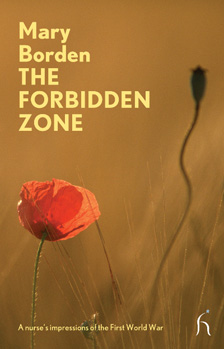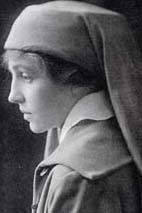Conspiracy
by Mary BordenIt is all carefully arranged. Everything is arranged. It is arranged that men should be broken and that they should be mended. Just as you send your clothes to the laundry and mend them when they come back, so we send our men to the trenches and mend them when they come back again. You send your socks and your shirts again and again to the laundry, and you sew up the tears and clip the ravelled edges again and again just as many times as they will stand it. And then you throw them away. And we send our men to the war again and again, just as long as they will stand it; just until they are dead, and then we throw them into the ground.
 It is all arranged. Ten kilometres from here along the road is the place where men are wounded. This is the place where they are mended. We have all the things here for mending, the tables and the needles, and the thread and the knives and the scissors, and many curious things that you never use for your clothes.
It is all arranged. Ten kilometres from here along the road is the place where men are wounded. This is the place where they are mended. We have all the things here for mending, the tables and the needles, and the thread and the knives and the scissors, and many curious things that you never use for your clothes.
We bring our men up along the dusty road where the bushes grow on either side and the green trees. They come by in the mornings in companies, marching with strong legs, with firm steps. They carry their knapsacks easily. Their knapsacks and their guns and their greatcoats are not heavy for them. They wear their caps jauntily, tilted to one side. Their faces are ruddy and their eyes bright. They smile and call out with strong voices. They throw kisses to the girls in the fields.
We send our men up the broken road between bushes of barbed wire and they come back to us, one by one, two by two in ambulances, lying on stretchers. They lie on their backs on the stretchers and are pulled out of the ambulances as loaves of bread are pulled out of the oven. The stretchers slide out of the mouths of the ambulances with the men on them. The men cannot move. They are carried into a shed, unclean bundles, very heavy, covered with brown blankets.
We receive these bundles. We pull off a blanket. We observe that this is a man. He makes feeble whining sounds like an animal. He lies still; he smells bad; he smells like a corpse; he can only move his tongue; he tries to moisten his lips with his tongue.
This is the place where he is to be mended. We lift him on to a table. We peel off his clothes, his coat and his shirt and his trousers and his boots. We handle his clothes that are stiff with blood. We cut off his shirt with large scissors. We stare at the obscene sight of his innocent wounds. He allows us to do this. He is helpless to stop us. We wash off the dry blood round the edges of his wounds. He suffers us to do as we like with him. He says no word except that he is thirsty and we do not give him to drink.
We confer together over his body and he hears us. We discuss his different parts in terms that he does not understand, but he listens while we make calculations with his heart beats and the pumping breath of his lungs.
They would not die and disappoint us if they could help it. Indeed, in in their helplessness they do the best they can to help us get them ready to go back again. It is only ten kilometres up the road, the place where they go to be torn again and mangled.”
We conspire against his right to die. We experiment with his bones, his muscles, his sinews, his blood. We dig into the yawning mouths of his wounds. Helpless openings, they let us into the secret places of his body. We plunge deep into his body. We make discoveries within his body. To the shame of the havoc of his limbs we add the insult of our curiosity and the curse of our purpose, the purpose to remake him. We lay odds on his chances of escape, and we combat with death, his Saviour.
It is our business to do this. He knows and he allows us to do it. He finds himself in the operating room. He lays himself out. He bares himself to our knives. His mind is annihilated. He pours out his blood unconscious. His red blood is spilled and pours over the table on to the floor while he sleeps.
After this, while he is still asleep, we carry him into another place and put him to bed. He awakes bewildered as children do, expecting, perhaps, to find himself at home with his mother leaning over him, and he moans a little and then lies still again. He is helpless, so we do for him what he cannot do for himself, and he is grateful. He accepts his helplessness. He is obedient. We feed him, and he eats. We fatten him up, and he allows himself to be fattened. Day after day he lies there and we watch him. All day and all night he is watched. Every day his wounds are uncovered and cleaned, scraped and washed and bound up again. His body does not belong to him. It belongs to us for the moment, not for long. He knows why we tend it so carefully. He knows what we are fattening and cleaning it up for; and while we handle it he smiles.
He is only one among thousands. They are all the same. They all let us do with them what we like. They all smile as if they were grateful. When we hurt them they try not to cry out, not wishing to hurt our feelings. And often they apologise for dying. They would not die and disappoint us if they could help it. Indeed, in their helplessness they do the best they can to help us get them ready to go back again. It is only ten kilometres up the road, the place where they go to be torn again and mangled.
Listen; you can hear how well it works. There is the sound of cannon and the sound of the ambulances bringing the wounded, and the sound of the tramp of strong men going along the road to fill the empty places.
Do you hear? Do you understand? It is all arranged just as it should be.
From The Forbidden Zone (1929, reissued in 2008 by Hesperus Press). Extracted from No Man’s Land: Writings from a World at War, edited by Pete Ayrton and published by Serpent’s Tail. Read more.
 Mary Borden was born into a wealthy Chicago family in 1886. Living in England at the outbreak of the war, she used her own money to equip and staff a field hospital close to the front in which she served as a nurse from 1915 until the end of the war. The stories in The Forbidden Zone are based on her experiences in the hospital. Her graphic descriptions of wounds and amputations and the lack of sentimentality in the precise, sparse writing were shocking for many readers. In the Second World War, she set up an ambulance unit that accompanied the Free French in France, the Middle East, North Africa and Italy. Her book Journey Down a Blind Alley (1947) is the story of this campaign. She died in Berkshire in 1968.
Mary Borden was born into a wealthy Chicago family in 1886. Living in England at the outbreak of the war, she used her own money to equip and staff a field hospital close to the front in which she served as a nurse from 1915 until the end of the war. The stories in The Forbidden Zone are based on her experiences in the hospital. Her graphic descriptions of wounds and amputations and the lack of sentimentality in the precise, sparse writing were shocking for many readers. In the Second World War, she set up an ambulance unit that accompanied the Free French in France, the Middle East, North Africa and Italy. Her book Journey Down a Blind Alley (1947) is the story of this campaign. She died in Berkshire in 1968.

